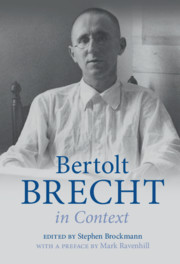Book contents
- Bertolt Brecht in Context
- Bertolt Brecht in Context
- Copyright page
- Contents
- Figure
- Notes on Contributors
- Chronology
- Abbreviations
- Preface
- A Note on Brecht in English
- Introduction
- Part I Brecht’s World
- Part II Brecht’s Work
- Chapter 13 The Work of the Theater
- Chapter 14 Brecht and Marxism
- Chapter 15 Brecht and Photography
- Chapter 16 Brecht and Film: Medium and Masses
- Chapter 17 Brecht and Fiction
- Chapter 18 Gestus in Context
- Chapter 19 Brecht’s Ethics
- Chapter 20 Brecht and Dialectics
- Chapter 21 Brecht and East Asia
- Chapter 22 Brecht’s Work with Musical Composers
- Part III The World’s Brecht
- Concise Bibliography
- Index
Chapter 20 - Brecht and Dialectics
from Part II - Brecht’s Work
Published online by Cambridge University Press: 28 May 2021
- Bertolt Brecht in Context
- Bertolt Brecht in Context
- Copyright page
- Contents
- Figure
- Notes on Contributors
- Chronology
- Abbreviations
- Preface
- A Note on Brecht in English
- Introduction
- Part I Brecht’s World
- Part II Brecht’s Work
- Chapter 13 The Work of the Theater
- Chapter 14 Brecht and Marxism
- Chapter 15 Brecht and Photography
- Chapter 16 Brecht and Film: Medium and Masses
- Chapter 17 Brecht and Fiction
- Chapter 18 Gestus in Context
- Chapter 19 Brecht’s Ethics
- Chapter 20 Brecht and Dialectics
- Chapter 21 Brecht and East Asia
- Chapter 22 Brecht’s Work with Musical Composers
- Part III The World’s Brecht
- Concise Bibliography
- Index
Summary
Marginalia in Brecht’s own copies of Unter dem Banner des Marxismus create a picture of his studies, between 1927 and 1934, in response to Lenin's call, issued in 1922, for a study of Hegelian dialectics "from a materialist standpoint." Taken together with their marginalia and the primary sources they cite, the articles by W. Adoratski, A. Deborin, and Wilhelm Reich published between 1925 and 1930 characterize the environment in which Brecht developed his understanding of dialectics and his aesthetics of epic theater.The intellectual underpinnings of this aesthetics, this chapter suggests, entail at least three concepts that are useful for epic theater’s anti-illusionist purposes: cause and effect (and its reversal) in history, including theater history; the relation of art (a material product of the “thinking brain”) to reality ("Art follows [reflects, contradicts] reality" – Brecht); and the dynamic in untenable antagonisms that, once recognized, portends their resolution (class struggle). Following Brecht’s close reading of these distinctions may help clarify the place in Brecht's theater of “militant materialism” and Lenin’s reflection theory of knowledge.
Keywords
- Type
- Chapter
- Information
- Bertolt Brecht in Context , pp. 174 - 181Publisher: Cambridge University PressPrint publication year: 2021

